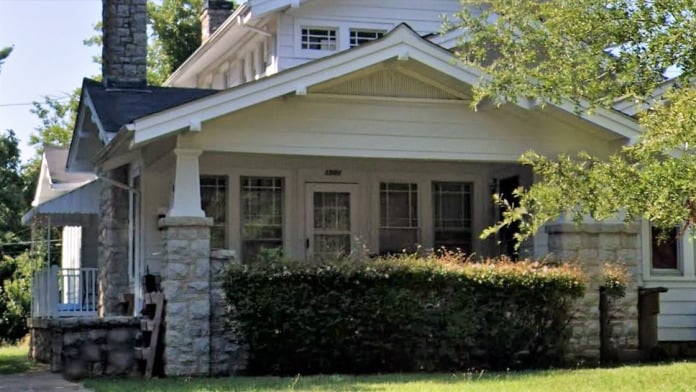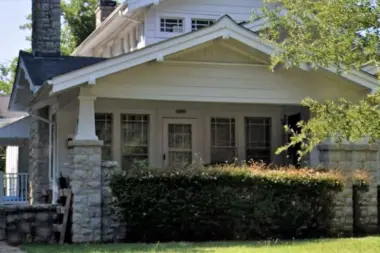About Maggie and Erma’s House
Maggie and Erma’s House in Greensboro, North Carolina, is a seven-bed faith based transitional living facility for women who genuinely want to break free from unhealthy substance use issues. This nine to 12 month program supports recovering women who have completed higher levels of care and now seek a structured setting to learn sober skills. The program guides single and noncustodial women toward becoming productive and responsible mothers. The facility boasts a safe, compassionate and Christian setting that inspires lasting recovery and personal fulfillment.
Recovery in Greensboro
Maggie and Erma’s House is located on West Friendly Avenue in Greensboro within Guilford County, North Carolina. This area is near downtown Greensboro and the University of North Carolina at Greensboro. Nearby landmarks like Guilford Courthouse National Military Park, Bog Garden at Benjamin Park and Lake Brandt add to the area’s attraction. Greensboro Transit Agency Bus Route 7 runs along West Friendly Avenue with links to downtown and other key areas. This ensures easy access to transportation when you want to run a quick errand offsite. Amtrak Station is about two miles east and provides rail service to major cities.
Residential Treatment for Women in North Carolina
Maggie and Erma’s House aims to restore moms to children and mend broken family relationships via this program. One of the core attractions is the sense of community and belonging that arises while living with peers in this homely and supportive space. Actively interacting with and communicating with these peers daily enables you to build a strong support network and even forge solid relationships that may last beyond the program. You’ll support and encourage each other and celebrate wins and losses together. You’ll also hold each other accountable. You’ll also benefit from the support of the staff who are available 24/7 to provide guidance and maintain discipline as necessary.
Daily Life at Maggie and Erma’s House
Recovery in this facility integrates faith-based principles, 12 Step practices and clinical care. You’ll attend individual and group counseling to address underlying psychological issues and learn effective coping and relapse prevention techniques. You’ll also attend Bible study and devotion to strengthen your personal relationships with Christ and find peace in recovery. Participation in 12 Step meetings like AA/NA is mandatory. You may also need to get a sponsor while working the steps.
Vocational Support
Another important component of the program is work and life management skills acquisition. This helps residents build responsibility and discipline through structured work assignments while gaining practical skills for independent living. Vocational skills learned can even help you secure and retain a job as you rejoin the community. You’ll complete the program with the skills, discipline and support needed to maintain lasting sobriety and rebuild your life having broken break free from unhealthy substance dependence. The staff may assist you with finding a house or employment as you move forward.
Rehab Score
Gallery


Other Forms of Payment
Self-pay involves paying for treatment out of your own pocket. You can use savings or credit, get a personal loan, or receive help from family and friends to fund your treatment. If you don't have insurance or your insurance plan doesn't cover a specific program, self-pay can help ensure you still get the care you need.
Addiction Treatments
Levels of Care
Sober Living Houses (SLHs), aka sober homes or halfway houses, are safe, substance-free, supportive living facilities for those recovering from substance abuse. Ideal for those who've just been through inpatient or outpatient treatment, SLHs are supervised environments with rules that support sobriety, such as curfews, shared chores, and therapeutic meetings. Residents are also often trained on life skills and coping skills to make it easier to transition into society. SLHs also provide a strong sense of community that can lead to the kind of deep and lasting connections with other sober individuals that supports a new, healthy lifestyle.
12-step programs are addiction recovery models based on Alcoholics Anonymous (AA). A number of substance abuse programs (including some drug and alcohol rehab centers) use the 12 steps as a basis for treatment. Beginning steps involve admitting powerlessness over the addiction and creating a spiritual basis for recovery. Middle steps including making direct amends to those who've been hurt by the addiction, and the final step is to assist others in addiction recovery in the same way. 12-Step offshoots including Narcotics Anonymous (NA), Cocaine Anonymous (CA), Dual Recovery Anonymous (DRA), Sex and Love Addicts Anonymous (SLAA) and Gamblers Anonymous (GA).
Treatments
The goal of treatment for alcoholism is abstinence. Those with poor social support, poor motivation, or psychiatric disorders tend to relapse within a few years of treatment. For these people, success is measured by longer periods of abstinence, reduced use of alcohol, better health, and improved social functioning. Recovery and Maintenance are usually based on 12 step programs and AA meetings.
There are many types of drug rehab in North Carolina. To receive treatment for addiction, you can choose from many inpatient and outpatient programs. Often, participants start with detox and work through a full continuum of care that continues with ongoing support for long-term recovery.
Opioid rehabs specialize in supporting those recovering from opioid addiction. They treat those suffering from addiction to illegal opioids like heroin, as well as prescription drugs like oxycodone. These centers typically combine both physical as well as mental and emotional support to help stop addiction. Physical support often includes medical detox and subsequent medical support (including medication), and mental support includes in-depth therapy to address the underlying causes of addiction.
Substance rehabs focus on helping individuals recover from substance abuse, including alcohol and drug addiction (both illegal and prescription drugs). They often include the opportunity to engage in both individual as well as group therapy.
Programs
Adult rehab programs include therapies tailored to each client's specific needs, goals, and recovery progress. They are tailored to the specific challenges adult clients may face, including family and work pressures and commitments. From inpatient and residential treatment to various levels of outpatient services, there are many options available. Some facilities also help adults work through co-occurring conditions, like anxiety, that can accompany addiction.
Young adulthood can be an exciting, yet difficult, time of transition. Individuals in their late teens to mid-20s face unique stressors related to school, jobs, families, and social circles, which can lead to a rise in substance use. Rehab centers with dedicated young adult programs will include activities and amenities that cater to this age group, with an emphasis on specialized counseling, peer socialization, and ongoing aftercare.
Clinical Services
Group therapy is any therapeutic work that happens in a group (not one-on-one). There are a number of different group therapy modalities, including support groups, experiential therapy, psycho-education, and more. Group therapy involves treatment as well as processing interaction between group members.
In individual therapy, a patient meets one-on-one with a trained psychologist or counselor. Therapy is a pivotal part of effective substance abuse treatment, as it often covers root causes of addiction, including challenges faced by the patient in their social, family, and work/school life.
Life skills trainings involve all the skills a person must have in order to function successfully in the world. These include time management, career guidance, money management, and effective communication. Truly successful addiction recovery is based on the ability to not only live substance-free, but to thrive. Life skills teaches the practical necessities of functioning in society, which sets clients up for success in life, and therefore sobriety.
Amenities
-
Residential Setting
Staff
Josette L. Daniels, PhD
Founder & Director
Contact Information
1501 West Friendly Avenue
Greensboro, NC 27403